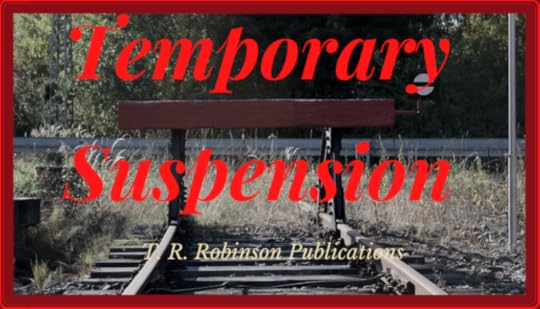T.R. Robinson's Blog, page 2
August 16, 2023
Writing To Current Trends

ContentsIntroduction
Transience
Motivation
Drawbacks and Issues
Exceptions
Conclusion
Related Article
Introduction
Most authors, inherently, look round for story suggestions or prompts, including those who already have a plethora of ideas. Observation is an important element for creating on page believable characters and settings. Even those who primarily write in the memoir and biographical genre need to be aware of life events. It is therefore no surprise many will consider current trends, either for ideas or for life insights. Some are subsequently tempted to write for the trend. However, should they? Is it a wise use of their time and energy? Will it prove useful to their overall aims and hopes?
TransienceTrends by nature are transient and consequently present challenges for authors. In the past reference to a trend primarily related to fashion. Fashion is governed by season and therefore usually had a life of a few months, at most a year. With the advent of social media and extensive online activity the trending term is now used to describe something that is currently, momentarily, popular or is being widely discussed online, principally social media. With shortening concentration spans and excessive internet distractions, the life of current trends are short. Sometimes it is simply a matter of hours. Of course, as with anything, there are exceptions. Some notable longer trends of the twenty-first century, though these also have a limited shelf-life, were:
Covid 19 pandemic (primarily 2020 to 2022)
Black Lives Matter Campaign (principally 2020 to 2022)
#MeToo controversy (2017 to 2020)
With the ease of modern self-publishing, a number of individuals took opportunity to write about their personal experiences during these events.
MotivationWhen deciding whether to write for a current trend, authors need to consider what it is motivating them to do so. There are primarily two motives:
Money
Self explanatory. However, bearing in mind the various aspects of, most of these books needing to be priced competitively, the publisher’s deductions, and limited royalties, is there really that much to be earned?
Popularity
Naturally authors seek ways to attract new readers as well as retaining existing ones. Writing for something that has current interest, even if it is time limited, has its attractions. However, as outlined below, there are drawbacks and issues writing for such transient topics.
Drawbacks and IssuesIf an author decides to go down the path of trend writing they must appreciate:
it will often take them away from their usual genre;they will need to understand how to write for different readers;their brand building may, most likely will, be impacted;dedicated readers may be disappointed and may desert;they will have to write very fast otherwise may miss the target audience;gaining a regular readership will be impacted negatively: e.g. romance readers will not be interested in horror, sci-fi, etc;very different cover designs, blurbs, and descriptions will be required;there will be a lot of extra work marketing to different groups;writing time for their primary genre will be impacted.Undoubtedly readers of this article will think of other drawbacks.
The temptation to write for these topics is understandable. Authors like to remain relevant and always wish to attract interest and readers. This may be a means for that but it has to be acknowledged, due to the transience, it is unlikely to be as effective as authors would like. Looking after their existing readers should take precedence. It is suggested, writing in the genre they are known for is best. Of course, there is nothing to stop them from expanding into other areas but it will need to be built steadily.
ExceptionsThough the overall view here is to write for something trending is unlikely to benefit an author, there are some points it is only fair to mention. A few of these principally transient books may have a longer future than anticipated.
Memoir: Along with the trend itself these have limited time interest. However, bearing in mind books never cease to exist, they may have some relevance in the future. Researches of such topics as social history, general history, science, pandemics, pharmaceuticals, etc., may find some of them a helpful resource. A bit hit and miss but always a possibility.
Historical: Historians may naturally consider some of these books of interest. Especially those who study social history. They will most likely have preference for the ones that consider the wider impact rather than the personal. Of course, researches of other topics may also benefit from the insights provided in these books.
Fiction: Some authors may utilise knowledge of the passing trends as background for stories and may even place some in the thick of it. As with most fiction, provided a proper tale is told, readers may continue to enjoy such books. The author will need to consider future audiences who may have no knowledge of the events depicted.
ConclusionWriting to trends usually requires an author to skip from one genre or topic to another in short time. It is unlikely to provide any meaningful return.
Regular readers and fans may be disappointed if their favourite author fails to provide the stories they enjoy and look forward to. They may move away permanently.
The author may be seen as simply jumping-on-the-bandwagon to make money and attract. Their reputation could be permanently damaged.
Authors need to seriously consider if writing to trend is really in their own and their readers, best interest.
Related Article:August 2, 2023
Author Voice – Maintaining

This is the third of three articles on the topic of Author Voice. This considers how to maintain author voice throughout the editing process. The first defined what author voice is. The second looked at how to find and develop an author voice.
Introduction
Outside Influences
Roundup
Related Articles
Maintaining author voice can be surprisingly difficult. Outside influences can impact. In an eagerness to produce the best possible outcome authors may lose sight of their determining voice by taking into account all amendment suggestions. Of course, they should consider suggestions but before implementing stand back and consider the impact such a change will have upon the work as a whole and on their voice in particular.
Outside InfluencesSome of the outside influences which may impact:
Beta Readers – The generosity of people willing to help authors by accepting and reading advance drafts of a work and providing feedback cannot be understated. However, the author should be aware each person is different and has their own outlook upon life. For example, what one see as positive another may consider negative. There are also social and cultural influences. Of course, the author should take into account all the feedback but ensure they are not led away from what was their original intent for the work or the voice they chose.
Editors – It will be easier to explain this by sharing a couple of examples:
1. One author who succeeded in having their manuscript accepted by a traditional publisher suffered with multiple editors. Apparently his editors kept leaving meaning the publishing company had to keep appointing new ones. Each had their own ideas, sometimes completely varied and contrary to those of previous colleagues. As may be imagined the author ended up in a confused and frustrated state. They could have tried to take on board all suggestions which, without doubt, would have undermined their author voice and probably the story. (In the end the author gave up and independently published the book, keeping their own unique voice.)
2. Another author employed an editor to help make their book the best they could. However, they found the editor did not ‘get’ the story. Had they accepted the suggested alterations their voice, as well as their book, would have been damaged. (They self-published without the editors amendments and went on to find success.)
Advice for editors, written by editors, includes:
Avoid revising text if there is no technical issue.If the content is correct and clear leave it alone.Leave punctuation, word choices, sentence and paragraph structures as is. (These usually form an integral part of an author’s voice.) Naturally, if there are glaring inconsistencies or conceived errors they can mention them but should not insist upon automatic correction/amendment.Grammar Tools – Usually very helpful but may lead the author to makes style changes which diminish their established voice. Naturally, authors should take note of suggestions and apply changes where they consider them appropriate. However, with a desire to produce the best writing possible, it is easy for them to feel under pressure to comply with all recommendations. This is not necessary. Some points may be ignored without diminishing the final product. To be able to make the right judgment authors should always keep the overall style of voice they have chosen to the fore.
Review Comments – Authors would be wise to read all reviews of their works. The positive, high rating ones provide encouragement. The less positive, or outright negative, often provide insights the author may not have recognised. Some reviewers not only review the content but go further by mentioning the writing style and presentation. These can be very useful to the wise author. No one ever stops learning. No one may confidently state they know all there is to know about a subject. The only mitigation to this are those reviews which are clearly malicious (sad to think there are people who consider such behaviour acceptable). However, though an author should never respond to, or feel disheartened by, such reviews it is still worth reading them to see if there are any valid points amongst the detritus.
RoundupThere are many influences that can undermine the voice an author has chosen for their work. Most are external though a lack of confidence or uncertain personality may also impact.
To maintain their chosen author voice throughout the writing and publishing process, authors need to know the voice they have chosen and keep it before them all the time. They may find it useful to utilise, and keep handy, the free worksheet available from this website.
Related Articles:July 19, 2023
Author Voice – Finding & Developing

This is the second of three articles on the topic of Author Voice. This considers how to find and develop author voice. The first defined what author voice is. The third looks at how to maintain author voice throughout the editing process.
Finding Author Voice
Benefits of Author Voice
Author Voice Elements
Understanding Personal Voice
Worksheet
Roundup
Related Articles
Having identified what Author Voice is in the first of these three articles it seems appropriate to now help authors find their unique voice. The first point authors need to be aware of is that developing their fully rounded writing voice takes time. Naturally everyone has an initial voice but authors will want to enhance their own to make their writing recognisable.
Some may feel it odd to suggest authors need to actually develop their author voice. Surely their natural voice is sufficient? This may be true for many but human nature has a tendency to fluctuate in different circumstances and if unchecked may lead to confusing writing for readers.
Benefits of Author VoiceAs mentioned, developing an author voice takes time. Consequently, some may ask if it is worth the effort and time. Why not just write in the manner that comes naturally without having to apply any extra effort? There are good reasons for investing time and effort into developing an author voice. Some benefits to having a unique author voice:
Helps gain a committed audience.Composes part of the author’s brand.Makes writing personal and recognisable.Enables author to determine reader experience.Writing becomes more relatable.Assists author to stand out from the crowd.Developing a unique author voice is considered essential by most however, it should not be done in isolation. Authenticity is also important. Authors are therefore advised to do it in conjunction with their own personality. Not to do so will make writing harder for the author and may come across as insincere or even false to readers.
Author Voice ElementsThere are various elements to consider:
Perspective: The position or angle from which the author wishes to impart the content. In the same way an artist decides from which position or angle to paint a picture an author needs to determine the position or angle from which to relate the story or account being shared. Some questions an author may ask themselves to help identify the position or angle they would like to adopt:
Why are they writing the book, article, post?Is there a specific opinion or point they wish to convey?Do they simply wish to tell a good story?Note: Most authors have a primary dominant perspective. However, with some effort and concentration they can change it for different projects. They should bear in mind this can be difficult to achieve but is not impossible.
Word Choice: This will be influenced by the style the author wishes to adopt:
Precise Language (e.g., in the UK this is identified as the Queen’s English).Regional Phrases (will need to ensure they have a good knowledge of those for the district the work is set in).Colloquial (will need to consider if they will include swearing, cursing, profanity, etc.).Sentence Structure: This will influence the author’s written voice. Will the author primarily use:
Long Sentences.Short Sentences.Mixed length Sentences.Note: Reader fans will expect to see a consistency throughout all the author’s works. This may change if they write in more than one genre in which case they may wish to ensure their readers are aware of it being a conscious choice.
Punctuation: Though not always considered a primary element of author voice, punctuation can influence the style: How will the author use it:
Sparingly.Consistently.Give preference to certain components e.g. “‘“, “””, “!”, “,”, etc.Point of View: The author should pick a regular narrator voice:
1st Person (I).2nd Person (You) (not easy to use for most story forms).3rd Person (He/She).Description v Dialogue: Most authors have a preference for predominately utilising one or the other. To develop an identifiable voice the author needs to determine an overriding style:
Description – Consistently using lengthy descriptions only adding dialogue where description alone is inadequate for the purpose.Dialogue – The story or account is principally driven by dialogue and conversation with description only added where necessary to enhance the scene for the reader.Substantial mix of both – Most writing experts advise choosing one but there is nothing to bar an author from breaking the mould and developing their own unique style. However, they should ensure this will not become confusing for their readers.Tone: This refers to how the author feels about the story or account and the emotions they wish to generate in their readers. Word choice plays a principle part in this element. Naturally tone can, and probably will, change between projects depending upon what is being shared. The author needs to decide at the commencement of a work. Tone can be:
SeriousFormalCheerfulComicalSadnostalgicEtc.It may help authors to consider the vocal tone they would use if telling the story or relating an account orally.
Understanding Personal VoiceIt may help an author identify their voice by asking a few personal questions.
What words do they use to describe themselves? – It may help to think of how they would do this with other people rather concentrate upon their own inner thoughts.
How do others describe them? – They could ask relatives, friends, colleagues, etc. Reviews may also provide some insight. If they have such a relationship with them they could ask their readership.
Which author voices do they like? – Obviously taken from the books they have a preference for. This may help distinguish their own voice and provide some insight on how to develop it further.
How do they usually communicate with others? – Consider letters, website/blog, social media, phone calls, etc.
WorksheetTo assist authors find their unique author voice a free straightforward worksheet is available. Click the button below to access it.
Download Free Finding Author Voice Worksheet.RoundupAs seen above, there are many elements to author voice. Understandably, it takes time for authors to fully identify their own voice and decide upon the voice to utilise in their writing. In the long term it will be time well invested as the final choice will give them a recognisable uniqueness that their readers will appreciate. The available worksheet may help reduce the time spent determining the choice.
Related Articles:Author Voice – Maintaining (Link will be provided when article published.)
July 5, 2023
Author Voice – Defined

This is the first of three articles on the topic of Author Voice. This considers what author voice is. The second contemplates how to find and develop author voice. The third looks at how to maintain author voice throughout the editing process.
Author Voice Explained
Components of Author Voice
Roundup
Related Articles
As with many in-house phrases it is easy for users to assume everyone understands what is meant. That is often a mistake. In this instance it is possible, probable, many authors do not fully comprehend what the term encompasses.
The phrase primarily refers to an author’s individual style. Their unique personality, intentionally or not, usually comes through in the writing. It is normally determined by their background, worldview, opinions, and experiences. In effect it is their recognisable signature. One readers recognise and has them coming back for more (assuming they like what they are reading).
Components of Author VoiceAuthor voice is a combination of various aspects: Word Choice, Syntax (explained further down), Punctuation, Tone, Perspective, Subject (sometimes).
Word Choice: Most authors tend to favour particular word styles. Casual, formal, complex, short, long, highbrow, colloquial, etc. This may sometimes, initially at least, be unconscious and is usually influenced by the society the author comes from. Once aware, those who write in more than one genre are able to consciously alter word choice to suit the relevant story form.
Syntax: The arrangement of words to form sentences (Oxford English Dictionary). Another description seen is ‘multiple words acting as a single unit’. Authors may not realise at first but they probably have an automatic, subconscious, way of phrasing information. With time they will be able to select a specific method that makes their writing identifiable. By changing the syntax authors are able to produce varied effects, control pace, and develop atmosphere. Many consider the variation of word arrangements is one tool authors may utilise to engage a reader and hold their interest.
Punctuation: To include this here may surprise some. However, how some authors utilise punctuation gives them a distinctive and identifiable style. Some use little while others favour multiple uses of certain elements.
Tone: The words and style authors utilise to express how they feel about the story or account being shared. Some also identify this as the means an author employs to evoke specific emotions in a reader. Though, by virtue of inherent human nature, most will have a general tone it may well alter through the story depending upon what is being shared at the time. Tone can be serious, formal, cheerful, comical, sad, nostalgic, and more. The range is as vast as human personalities. It may help authors to consider the vocal tone they would use if telling the story orally.
Perspective: How the author chooses to view and impart the content and action. It is unique to them. Others observing the same event may well come up with a different take. In the same way an artist decides from which position or angle to paint a picture an author needs to determine the position or angle from which to relate the story or account being shared. Perspective is usually influenced by the writer’s own experiences.
Note: There are warnings for authors not to confuse perspective with point of view. In writing there are distinctions. In this context, point of view refers to how the content is being narrated i.e. 1st Person (I), 2nd Person (You), 3rd Person (he/she).
Subject: This is not seen as a general component of author voice however, some authors are known for particular genre, specialities, and subject choices.
RoundupThough it may not be an absolute essential, most authors will benefit from having a distinctive voice. In truth, whether aware of it or not, their writing probably has an inherent identity.
Authors would do well to pay attention to developing a voice readers will readily recognise. A dedicated fan base would be looking for it. It would reassure them the book they are reading is by the author they value and appreciate.
Developing a fully rounded author voice takes time, sometimes years. Nevertheless, it is worth the time investment and effort. Authors should remember their books never cease to exist.
In considering the various aspects of author voice explained above, it is obvious there is a lot of crossover. Ultimately, accomplishing all components boils down to the primary features of word choice and style.
It is important to clarify this article is about Author Voice alone. The other types of voice books automatically incorporate are not under consideration here i.e. narrator and character. Briefly:
Authors – construct the story.
Narrators – convey the story.
Characters – live the story.
Aspiring authors should not be put off if they feel they do not have an identifiable author voice yet. They should still write. As already mentioned, by virtue of their uniqueness they will have some sort of individual voice that they will be able to develop over time.
Related Articles:Author Voice – Finding & Developing (Link will be provided when article published).
Author Voice – Maintaining (Link will be provided when article published).
June 21, 2023
Author Resources Update
 Contents
Contents
Worksheets and Checklists
Infographics
Content Lists
When first provided, in an effort to make them more enjoyable, these were created in robust colour formats. However, it became apparent, for those wishing to print them, the colour strength would result in additional printing costs for the user. The decision has therefore been made to now only provide these in a primarily monochrome format. A decision that turns out to perhaps make these resources of more help (the multiple colours could be distracting, taking attention away from the matter in hand). Links for downloading all resources are available from under the resources tab above as well as from within instigating articles.
InfographicsThough these do not appear to be as popular as once they were, they remain useful aids. Anticipation is, or at least was, users would wish to download and print these to keep on their desks or to hand as quick reminder reference guides. With that in mind, retaining the colourful format for these seemed to the best option.
Content ListsIt may have been noticed that some newer articles and posts have clickable contents lists included near the top. This is a new facility which has the potential to help readers, especially where some of the information is already know to them and they wish to skip it and go straight to an alternative section. Though overall useful, a list is only provided where the article is fairly lengthy and there are multiple sections. Some do not really require such a content list and are therefore left without as they normally flow without the need to be segmented.
June 7, 2023
The Continuing Relevance of Authors

Anyone with an outfacing profile or business will undoubtedly encounter occasions when they question their relevance. Relevance with regard to the market they work within, the target audience, or to society in general.
Before continuing it may help to consider what it means to be relevant.
‘Something that is relevant to a situation or person is important or significant in that situation or to that person.’ (Collins Dictionary)
‘having significant and demonstrable bearing on the matter at hand’ (Merriam-Webster)
‘related to the matter in hand.’ (‘applicable, pertinent, germane.’) (Oxford English Dictionary)
The Collins definition is the most helpful in the context of this discussion. However, the other definitions assist if the reader comprehends what is meant by ‘the matter in hand’. For an author the matter in hand is more likely the readership they hope to attract.
It is inevitable anyone serious about their business will question their relevance regularly. The frequency will vary between individuals but is likely to increase with passing years. Society, trends, and habits change with each generation. The creator of a product (book) will wish to ensure anything new meets audience expectations. Fine when the producer (author) aims to attract a new market. However, how does the concept stand with respect to already existing products and the future? Do books become irrelevant with time? Most authors will appreciate a definitive NO is the answer. Why?
Irrespective of time all books hold their own in one form or other. This applies to both fiction and non-fiction.
FictionThough most fiction is written to entertain there are many examples of it also being used to highlight social, political and other issues. Charles Dickens made a point of this. Jane Austen, who had a great sense of humour, depicts some of the ridiculous aspects prevalent to the high society of her time. Though the more subtle points in their books may be missed by some readers no one can deny they are entertaining. There would not be so many adaptations if they were not. Classic author books have certainly withstood the test of time. So have some written by more modern authors: Agatha Christie, Sir Author Conan Doyle, P. D. James, Colin Dexter for example. Twentieth Century authors have also used their books to address religious and social incongruity. Whether intended or not authors rarely avoid portraying something of themselves in their books. In one form or other their beliefs, opinions, outlook, etc., find expression.
Authors, especially independent (indie) ones often fear their books will cease to be of popular interest over time. It cannot be denied this is sometimes the case however, there are examples of books finding new popularity long after the author’s departure. A couple of examples:
The Phantom of the Opera short story was first published in 1909 with mixed reception. Andrew Lloyd Webber came across it while on holiday and in 1986 produced the highly popular theatre show. It was so popular a further adaption into film came out in 2004.
A woman (name not recalled) published a memoir (year unknown) that failed to find an audience. The book languished for years. Then for no apparent reason (there had been no publicity or marketing) the book became popular during her grandson’s fortieth decade.
Authors should bear in mind, even if a book is withdrawn from retail book shelves (bricks and mortar and online), it never ceases to exist. It may always be discovered by readers. Neither should they forget the existence of libraries, secondhand book retailers, and charity shops.
In the midst of life, some of which can be stressful, people often look for ways to relax and temporarily escape. Books are one way to achieve this. During the Covid-19 lockdown reliable statistics evidence a marked increase in reading.
Non-FictionThe non-fiction category is widespread. Besides the obvious, such as text books, specific guides, scientific investigation, historical accounts, self-help and so on, the category also incorporates memoir, biography, essays, poetry, art, photography, and more.
Books are never out of date or irrelevant. Even books that deal with past technologies have a place on bookshelves. In all there are various elements of interest.
The human mind is predominately an inquiring one. There is the general pleasure enjoyed by many of simply knowing and storing facts. Perhaps more importantly is that the understanding and comprehending of events and experiences helps put current life into perspective. Studying the past often helps make sense of the present. It can be revealing and assist people to realise they are not alone in their experiences. There is also an element of learning.
Developing new products and technologies relies upon an understanding of what came before. Frequently the new is the result of brick building i.e. without each previous development the new could not exist.
Readers may find resolutions to their life challenges in how other people have dealt with their own issues. Sadly, many have to struggle with difficult lives. They often feel they are on their own without a viewable solution. Accounts of similar experiences give them succour and hope.
Books also provide a trove of information for researchers.
RoundupBooks never lose relevance. In many, fiction and non-fiction, readers may learn, discover, find hope, be inspired. Books can provide relaxation, insight, and answers to some life questions and challenges.
Authors need to remember, irrespective of genre and subject, they are providing a service and a contribution to posterity’s library. Their books also form part of their ongoing legacy. Even years after publication their books may be discovered, become popular, and provide help to readers. In addition, even though they may not have benefited themselves at the time of publication, their books may furnish an income for their decedents.
Irrespective of whether they write fiction or non-fiction authors are always, in one form or other, relevant.
Related Article: The Ageing Author
May 24, 2023
The Ageing Author

No living organism can avoid the ageing process. Nor can it sidestep the eventual consequent deteriorations. The process may vary between individuals but at some stage it will have an impact. This article will centre upon the human condition, with particular focus on authors.
General Ageing Limitations
Managing Ageing Limitations
Impact of ageing on Authors
—Discouragement
—Overcoming Discouragement
—Author Relevance
—Energy
Conclusion
Related Article
Most people will experience the following as they age:
Increasing health issues.Weakening bodily functions.Decreasing physical strength.Slowing mental agility.Other possibilities are:
Forgetfulness.Shortening attention span.Memory loss.Confusion.Impaired judgment.Difficulty learning new skills.It should however be born in mind each person is different. The timing of the process varies from person to person. There are those who at the age of eighty retain the faculties they had at thirty while others at sixty cannot keep up with a ninety year old.
There are also the challenges of social attitude. Regrettably, some consider elder people inconsequential. Worse still is those who treat an older person as mentally deficient. Hopefully such attitudes are not widely prevalent though there are signs of it becoming an increasing problem. There is certainly evidence of many not valuing older relatives, speedily moving them to a care facility because they cannot be bothered. Whatever happened to family love, loyalty and care?
Managing Ageing LimitationsEveryone, including authors, need to discover ways to live with and manage the inevitable issues age brings.
With health, physical deterioration, and mental changes it is a matter of understanding what the changes and limitations are and finding ways to work with or round them. Consulting a doctor is obviously a first step for some issues. Medication, physiotherapy, or counselling may provide appropriate resolution or help.
When it comes to mental issues it may help to engage in puzzles or the like, participate in discussion forums, or seek a psychologists assistance. An important aspect with mentality is not to allow fear to control. Everyone, if they are honest, fears decreasing mental ability. However, in the majority of instances it can be managed.
These are just a few quick thoughts. Far more insight may be gained from national health sites, research, and consultation with experts.
Impact of Ageing on AuthorsUnless outstandingly successful, age may result in some authors becoming discouraged. Each book demands considerable input of energy and time, to then see it not sale widely is disappointing. In earlier years authors are robust enough to weather the disappointment however, age often leads to a reduced ability to fight negatives. That does not mean it cannot be managed and turned round.
Some may also feel they have run out of steam and have nothing further to contribute. NOT TRUE as will be seen in a moment.
It is not practicable to try and deal with all issues within one article. The following will therefore concentrate upon the aspects of discouragement, author relevance, and energy.
DiscouragementDue to the nature of authoring and the inundated modern book market, discouragement at some stage is almost inevitable. This is especially true for older authors with who it can become a primary factor. A couple of dictionary definitions may help put the issue into context.
‘the state of having lost your confidence or enthusiasm for something.’ (Cambridge Dictionary)
‘something that makes you unwilling to do something because your are afraid of the consequences.’ (Collins Dictionary)
After years of, often exhausting, hard work and not seeing a great uptake, disappointment leading to a heavy sense of discouragement is inevitable. As the dictionary definitions indicate this may lead to the author giving up or at least feeling there is no point in continuing, becoming apathetic.
Authors: Do not accept this! It is not inevitable. Discouragement and disappointment can be overcome .
Overcoming DiscouragementDiscouragement does not have to be accepted. It can be overcome. There are various suggestions upon how this may be achieved:
First, as with many situations, the author needs to be honest with themselves. They need to identify what it is they are feeling or fear. Without this understanding it will be hard to move on.Frequently, when in the midst of discouragement and disappointment, it is easy to see the situation as worse than it is. The author should look back and remember when matters appeared bad but subsequently improved. Tomorrow is often better.While looking at current negatives, authors may forget what they already have. For example, books, experience, knowledge, abilities (often gained during the process of writing). They should be grateful for these and look at how to freshly leaver them for the current market. Sometimes it is simply a matter of changing a book’s cover and/or rewriting the description/blurb.Often there is peer pressure to only recognise success as measured by sales. Especially true in these days of social media. Such an attitude can distort true success. A product’s quality is a far better gage of achievement. This is usually evidenced by positive reviews, even if there are only a handful.Concentrating on the work itself rather than potential rewards usually helps an author reassess their position.Where focusing upon what already exists is not helping, investing in a new project may brake the dilemma. As with so called writer’s block, starting something new usually gets the brain and creative juices flowing again.Some suggest making a list of those things seen as negatives and failures along with existing abilities and resources. Throughout, the author should be looking for ways to utilise what already exists and for new opportunities. Their ultimate aim is to identify ways to move forward.
Author RelevanceWith age many, including authors, may come to feel they no longer have anything to contribute to their modern society. That what they have belong to the past, to their generation, to previous social attitudes and protocols. That is never true, everyone has something to contribute whether it be knowledge, experience, resource, or products.
Books are never out of date or irrelevant. Nor do they ever cease to exist even if withdrawn from sale. Fiction retains its entertainment value throughout time. In reflecting life and events many also add elements of interest and learning for readers. Non-fiction, a category that covers a wide range, naturally provides information that mostly remains relevant. Even those that deal with past technologies deserve their place on bookshelves. Researches in particular will wish to know about past developments.
Readers have varied reasons for reading, as varied as people are themselves. Some simply desire a means of escaping the world for a short while. Others are seeking information to help with some current research, interest, problem, or event. The list goes on. Despite the internet advent books continue to be a major source of reliable information.
A further article The Continuing Relevance of Authors that provides more detail and insight will be published next. (A link will be provided when it is published.)
Energy (Effort)The ageing process, especially if accompanied by physical or mental limitations, can be tiring. With passing years some may feel they have run out of steam. That they no longer possess the energy to continue with previous tasks. That they no longer have anything to contribute. Though these are understandable responses they are not ones to embrace.
Everyone, no matter their age, has something to contribute. Authors do not really run out of ideas or topics to write about. As with so called writer’s block such a feeling is a temporary blip that may be overcome. Through general observation, the news, experiences, and imagination, there are always a plethora of possibilities. Most stories and accounts have their roots in such. It is no different in later life. An authors creativity never ceases. It is part of them. They simply need to let it flow. The discipline of starting on something new, or revisiting previous drafts or completed works, will unusually, inevitably in most cases, kickstart the writing process again.
It would be foolish to say age does not impact energy to some degree. Inevitably, some tasks will take longer to accomplish. This however, does not mean people have to give up. Ways to manage the restraint can and should be embraced.
ConclusionNo one, including authors, can avoid ageing. It is a natural progression of life. However, it is not necessary to give in to the limitations and difficulties it brings. Authors never truly run out of steam, ideas, or creativity. Should any feel they have it is usually simply a matter of refocusing or finding ways to work with or round the limitation encountered. No matter their age, they have a lot to give.
Related Article:The Continuing Relevance of Authors (Link will be provided when the article has been published.)
May 10, 2023
Welcome to T. R. Robinson Publications

Contents
Welcome
Website Purpose
Keeping Up To Date
Posting Frequency
Asking Questions
Getting Latest News
Translation Service
Whether you are a new or regular visitor to this website and blog, you are very welcome. It is hoped you will find available and subsequent content of interest and help. If you have a particular area of interest, relevant articles and posts may be located either from the Categories list to the right or by carrying out a keyword search.
Website PurposeAs indicated elsewhere, the primary purposes for this website and blog are:
1. Assisting authors with tips on publishing, marketing and writing;
2. Enabling readers to find interesting and entertaining books;
3. Helping authors, especially independent ones, publicise their books;
4. The publication and publicising of books by T. R. Robinson. (Besides sharing dramatic and very unusual true life accounts, the books aim to inspire, encourage, and give hope to all those who face difficulties. These show it is possible to escape abuse and go on to live a reasonable life.)
To facilitate the above aims, information on a variety of interests and topics is shared. These include: writing; the author path; book publishing, publicity, and marketing; online activity; social media; reading and reviewing books; computer usage; and more.
Though it is hoped what is shared will assist all authors, emphasis is placed upon helping amateur and new independent authors understand and develop their craft and art. It is also hoped some of the information will benefit others who may not be authors but are active online.
When time permits, with readers in mind, reviews of books read together with author interviews and highlights are published.
Keeping Up To DateIf you would like to be kept up to date with what is happening in this website and blog, you may signup for e-mail notifications of new articles and posts. Simply enter your e-mail address in the panel located near the bottom of the column to the right. You need not be concerned about receiving unsolicited mail or spam as the signup process in not a per se e-mail capture facility; it just provides for automated update notifications.
Posting FrequencyThough every effort will be made to post articles on a reasonably regular basis there are some life issues limiting time availability for online activity. This may result in extended intervals between posts. It is hoped visitors will not find this too distracting. The principal aim to publish quality information authors and readers alike will find helpful and interesting will not be impacted.
Asking QuestionsIf you have any questions, enquiries or observations please utilise the website Contact Form by following this link or by going to the Contact page under the ‘About’ tab above. Naturally, should you have any observations or enquiries about a particular article or post, you may utilise the comments option for that article or post.
Getting Latest NewsObviously, far more goes on than is shared in the website and blog. Therefore, for those interested in the latest, TR News, Publishing World News, Author Resources, and more, a newsletter is available. You may subscribe for it here or at the top of the righthand column. Please be assured, your name and email address will not be shared from this site with anyone else, you will not be sent any spam from here, and you may unsubscribe should you wish.
Translation ServiceA translation service, for those who prefer to read in an alternative language, is available in the footnotes to this website.
May 3, 2023
Reactivation of T. R. Robinson Publications
 Contents
Contents
Apologies
The Future
Nature of Articles
Social Media
New Books
Newsletter
Deleted Posts
Roundup
When the temporary suspension of activity on this site and associated accounts was notified expectation was it would be just for a matter of months. Obviously it has been far, far longer for which apologies are extended to all (regular and new visitors). The delay has not been for the lack of trying but circumstances intervened. Hopefully, people have found the existing material useful and will find forthcoming articles and posts equally helpful.
The FutureRegrettably, the factors inhibiting an earlier return still prevail. Nevertheless, some leeway has been found and every attempt will be made to add new material though the frequency may be a bit haphazard.
Nature of ArticlesMost new posts will continue to be about authoring. These will include such things as insights into the craft, information upon using associated facilities (e.g., social media sites), identification of new author resources, etc. When there has been opportunity to read, book reviews will also be added.
Social MediaDecisions had to make where to best spend available time. The overruling question: What would be most helpful to the website and blog followers? The answer: New articles and posts which provide inspiration, encouragement, and help for fellow authors. Consequently, social media activity will be limited. However, every effort will be made to respond to comments that require it and questions, though such responses are unlikely to be immediate. Of course, it is hoped new and useful posts on these sites will occur from time to time.
New BooksIn addition to the other aims for the website, mentioned in various places, the publication and promotion of books by T. R. Robinson continues: Memoir, Autobiography, Biographical Fiction, Essays, etc. Besides the entertainment value, part of the intention for these books remains to help readers, who experience similar circumstances, to know they are not alone and possibility of a different life exists and can be obtained.
NewsletterInevitably there will be, and has always been, news and information not suited to a website blog article or post but are yet of interest and relevance. Intention is to share these by means of the website newsletter. Such matters as: Publishing World News (that may help or impact indie authors), New Author Resources, and similar insights will be included. As with posting, newsletter frequency is uncertain but is likely to be reasonably regular.
Subscribe here or from the top of the side panel.
Deleted PostsTo make the website and associated blog easier to navigate, expired (e.g., competition notifications, discount offers, etc.) and no longer relevant articles and posts (e.g., closure of G+, superseded systems and processes, etc. ) are being deleted. Due to the continuing time constraints, this will be an ongoing process. It is unlikely the gaps between article publications will be noticeable but this notification has been provided just in case.
RoundupSharing with general readers and fellow authors has been missed. Though in limited form, it is good to be back. Hopefully, both will find the new material interesting, useful, and above all helpful.
July 20, 2021
Temporary Suspension
 Temporary Suspension of ActivityEvery effort has been taken over recent months to keep this website and blog active with, hopefully, interesting and helpful information.
This despite a number of matters requiring regular real-time intervention.
Unfortunately, the demands continue and increase.
Consequently, with regret, the decision has had to be taken to temporarily suspend activity.
Apologies are extend to all readers for the inconvenience this will cause.During the suspension readers may still benefit from the many years worth of available articles on varied topics such as:Author Help and GuidesWriting Resources and TipsBook MarketingSocial Media Usage and SuggestionsBook ReviewsAuthor InterviewsOnline SafetyAnd Much More
Relevant articles may be located either:
From the categories list to the right;orBy entering an appropriate Keyword in the search panel (also to the right).
Temporary Suspension of ActivityEvery effort has been taken over recent months to keep this website and blog active with, hopefully, interesting and helpful information.
This despite a number of matters requiring regular real-time intervention.
Unfortunately, the demands continue and increase.
Consequently, with regret, the decision has had to be taken to temporarily suspend activity.
Apologies are extend to all readers for the inconvenience this will cause.During the suspension readers may still benefit from the many years worth of available articles on varied topics such as:Author Help and GuidesWriting Resources and TipsBook MarketingSocial Media Usage and SuggestionsBook ReviewsAuthor InterviewsOnline SafetyAnd Much More
Relevant articles may be located either:
From the categories list to the right;orBy entering an appropriate Keyword in the search panel (also to the right).



